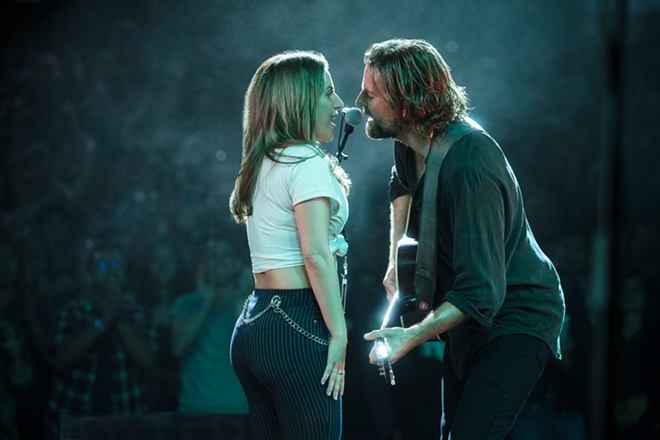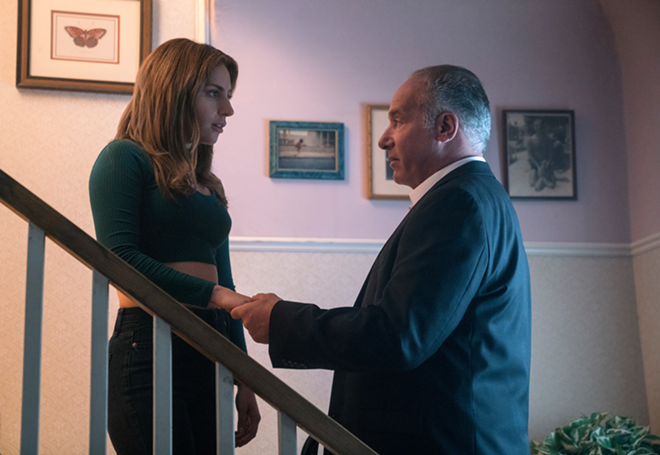
Timeless stories are oft retold, and few stories are as timeless as new love trying to survive the challenge of rising fame.
For the third time in 64 years, Hollywood has repackaged and repurposed one of its most enduring stories, A Star Is Born. But if you believe this is just the third iteration, then you’re as foolish and reckless as the tale’s two souls trapped in the blinding spotlight of celebrity.
Countless films have used A Star Is Born as a springboard to explore excess and euphoria, but rarely has there been a moment in history that seemed so perfectly suited to dissect these themes.
We're living in a gilded age of instant gratification and constant scrutiny, where social media never sleeps and cable news anchors never sign off, and anyone with a video camera and an ethernet cable can emerge as the Next Big Thing, based solely on the number of views and likes that a single post generates.
In this regard, A Star Is Born should serve as both a cautionary tale and a documentary expose. And who better to headline a modern-day retelling than Lady Gaga, an artist who exploded into the pop culture zeitgeist almost overnight?
So why, then, is the 2018 version of A Star Is Born so confounding? Why does it shine only in brief, beautiful bursts (basically any time Gaga opens her mouth to let her gorgeous pipes roar), instead of finding and maintaining a proper groove from start to finish?
As co-written by Bradley Cooper, marking his directorial debut, A Star Is Born starts strong with Cooper’s Jackson Maine, a beloved outlaw country crooner, headlining sold-out stadium shows. (Note: Cooper wrote the character's last name as one of several nods to past iterations; James Mason played Norman Maine in the 1954 version, opposite Judy Garland.)
But there’s a darkness threatening to swallow his bearded, yet sensitive, soul. You first see him offstage, chugging pills and slugging from a bottle of booze, before striding toward his microphone, awash in adoring screams.
Somewhere across an unnamed city, miles from where Maine is performing, Gaga’s Ally (it’s frustrating that she isn’t given a proper last name) is dealing with her own demons. You first see her shouting into a phone, telling some unnamed man that she will not marry him, before she strides out into a professional kitchen where a supervisor rides her ass for being late to work.
A few hours later, Ally and Maine meet cute in a drag bar (keep your eyes peeled for several alumni of RuPaul’s Drag Race, including Shangela and Willam Belli) after she belts out a stirring rendition of “La Vie En Rose” and gets introduced to Jackson by her bestie.
“Everyone in this bar has talent,” Maine tells her. “Having something to say, and a way to say it, is different.”
The pair leave and travel to another bar, where Ally defends Maine by punching an obnoxious cop in the face. Then they go to a local pharmacy so Maine can buy frozen peas and medical tape to soothe Ally’s bruised fist.
The woman working the register recognizes him, and snaps a quick cell phone picture, before asking permission. “Be careful,” Maine says, nodding at Ally, “she’ll hit you.”
Sitting in the pharmacy parking lot, they talk and laugh like teenagers on an unexpected first date, and Cooper uses his camera to gently capture the infancy of their burgeoning relationship without bludgeoning the audience. And, then, without warning, Ally belts out a verse to a song she’s been writing, the foundation for what will become “Shallow,” the film’s love theme (and one of Gaga’s best ballads to date).
It’s a transcendent moment in a film that needs a lot more ‘wow’ to distinguish it from earlier versions of the same story.

Maine drops Ally off at her home. We meet her father, Lorenzo (Andrew Dice Clay), a quintessential Italian patriarch, and his friends. (No joke, the Diceman is a revelation in this role, and if his part were more substantial, he would be guaranteed an Academy Award nomination). And, then, almost immediately, Maine dispatches his driver to go pick Ally up to fly her to a concert the very next night.
When Ally arrives at the show, Maine has inexplicably already spun a song out of the single verse she sang for him. And he, again, inexplicably, calls her forth on stage to sing it with him. She nails it, of course, creating a second transcendent moment — probably the film’s best — that will fill the audience’s heart with hope for what’s to come.
The problem with this sequence of events is that it arrives like a blitzkrieg instead of a carefully nurtured and nuanced reveal. Life just doesn’t move that fast.
Yes, new love is messy and, at times, might feel like a sped-up time-lapse of events overlapping one another until it creates an overwhelming blur, but there’s no need to accelerate to that degree here, especially not when what follows plays like a paint-by-numbers art project, a greatest-hits mash-up of all the highs and lows that anyone who has ever watched an episode of VH1’s Behind the Music knows to expect.
And that’s a true shame.
Within a matter of days, Ally has quit her job and her old life and is touring with him and performing and becoming recognized for her own innate talent. As expected, a record producer sees her potential. He signs Ally to a deal. Suddenly, she’s being groomed for stardom and all the add-ons (dancers, choreography, costume changes) that accompany it.
Meanwhile, Maine is devolving into a gin-soaked wreck. He doesn’t so much resent the attention being showered on Ally as he fears it for her because he’s already experienced what it brings. Regardless, he winds up blacked out in the yard of a longtime friend, Noodles (Dave Chappelle), and once he’s sobered up, he proposes to Ally, who has flown away from a rehearsal to check on his well-being. Of course, she says yes. And, of course, as only happens in the movies, they decide to have the ceremony that very day.
A Star Is Born makes a marked transition at this moment, switching from Maine downward spiral to Ally’s ascension as a performer. It’s a necessary yet curious decision, if only because Ally’s story essentially becomes Gaga’s story — a head-on collision of reel life and real life, so to speak.
The problem is that nothing about the screen story feels authentic. And, worse, it feels unnecessarily rushed.
Whereas Ally was introduced passionately performing Édith Piaf’s classic, and the early songs she shared with Maine were heartfelt and moving, her talents are packaged differently once the music machine takes over. She appears on Saturday Night Live basically playing a variation of Lady Gaga complete with dancers and singing mindless, bubblegum pop while oozing sex appeal. And then is immediately rewarded with multiple Grammy nominations.
If Cooper’s intention, as a director, was to try and make a statement about the nature of the music industry beast to discourage innovation and replace it with something more pedestrian that can be universally embraced, that’s fine, I guess. But in doing so, he’s basically attacking Gaga’s own career trajectory at the same time he’s trying to convince his audience to champion her on-screen artistic credibility.
The remainder of Cooper’s A Star Is Born plays like a millennial school production of the 1976 version of A Star Is Born, in which Barbra Streisand’s Esther Hoffman only wanted love from Kris Kristofferson’s fading rock god John Norman Howard, who was incapable of getting out of his own way long enough to realize how good he had it with her, fame or no.
Maine makes some terrible decisions fueled by his various addictions, which are never properly or thoughtfully discussed. He embarrasses Ally at the Grammys. He goes into rehab. He tries to become a better man and person. And yet, still, he’s felled, not by his demons so much as the selfish machinations of someone profiting off of Ally’s shining star, whose opinion really shouldn’t matter. And then the movie is basically over, save for one last showcase, a final spotlight reminder of just how good Gaga can be.
And really, maybe that’s the point that we’re supposed to take away from the entire exercise.
While A Star Is Born had the potential to be an all-time classic, it fails to break new ground because it’s too busy trying to please everyone at once instead of finding the proper focus.
As a directorial debut, however, it’s a smashing success for Cooper, even with its flaws. He’s a natural behind the camera, and in time, he should deliver fully on the promise that he displays here in fitful bursts.
But, as a triple-threat performer, actress-singer-and-icon, it’s Lady Gaga who benefits most from this opportunity. She’s believable and incredibly strong when it matters most during the film’s dramatic moments, and every time she opens her mouth to sing, she takes the audience on an emotional journey that’s instantly memorable and thoroughly satisfying.
It’s her voice, and her voice alone, that saves this version of A Star Is Born from being just another remake of the same timeless story we all know so well.
John W. Allman has spent more than 25 years as a professional journalist and writer, but he’s loved movies his entire life. Good movies, awful movies, movies that are so gloriously bad you can’t help but champion them. Since 2009, he has cultivated a review column and now a website dedicated to the genre films that often get overlooked and interviews with cult cinema favorites like George A. Romero, Bruce Campbell and Dee Wallace. Contact him at bloodviolenceandbabes.com, on Facebook or on Twitter.

